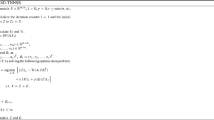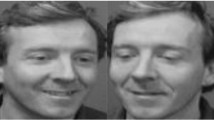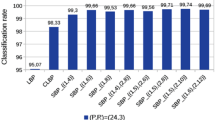Abstract
Sparse modelling involves constructing a succinct representation of initial data as a linear combination of a few typical atoms of a dictionary. This paper deals with the use of sparse representations to introduce new nonlinear operators which efficiently approximate the dilation/erosion. Non-negative matrix factorization (NMF) is a dimensional reduction (i.e., dictionary learning) paradigm particularly adapted to the nature of morphological processing. Sparse NMF representations are studied to introduce pseudo-morphological binary dilations/erosions. The basic idea consists in processing exclusively the image dictionary and then, the result of processing each image is approximated by multiplying the processed dictionary by the coefficient weights of the current image. These operators are then extended to grey-level images by means of the level-set decomposition. The performance of the present method is illustrated using families of binary shapes and face images.
Access this chapter
Tax calculation will be finalised at checkout
Purchases are for personal use only
Preview
Unable to display preview. Download preview PDF.
Similar content being viewed by others
References
Bloch, I., Heijmans, H., Ronse, C.: Mathematical Morphology. In: Aiello, M., Pratt-Hartmann, I., van Benthem, J. (eds.) Handbook of Spatial Logics, ch. 14, pp. 857–944. Springer, Heidelberg (2007)
Donoho, D., Stodden, V.: When does non-negative matrix factorization give a correct decomposition into parts? In: Advances in Neural Information Processing 16 (Proc. NIPS 2003). MIT Press, Cambridge (2004)
Elad, M., Aharon, M.: Image denoising via sparse and redundant representations over learned dictionaries. IEEE Trans. on Image Proc. 15(12), 3736–3745 (2006)
Heijmans, H.J.A.M.: Morphological Image Operators. Academic Press, Boston (1994)
Hoyer, P.: Non-negative Matrix Factorization with Sparseness Constraints. J. Mach. Learn. Res. 5, 1457–1469 (2004)
Lee, D.D., Seung, H.S.: Learning the parts of objects by non-negative matrix factorization. Nature 401(6755), 788–791 (1999)
Lee, D.D., Seung, H.S.: Algorithms for non-negative matrix factorization. In: Advances in Neural Information Processing 13 (Proc. NIPS 2000). MIT Press, Cambridge (2001)
Li, S.Z., Hou, X., Zhang, H., Cheng, Q.: Learning spatially localized parts-based representations. In: Proc. IEEE Conf. on Computer Vision and Pattern Recognition (CVPR), Hawaii, USA, vol. I, pp. 207–212 (2001)
Mairal, J., Elad, M., Sapiro, G.: Sparse representation for color image restoration. IEEE Trans. on Image Proc. 17(1), 53–69 (2008)
Ronse, C.: Bounded variation in posets, with applications in morphological image processing. In: Passare, M. (ed.) Proceedings of the Kiselmanfest 2006, Acta Universitatis Upsaliensis, vol. 86, pp. 249–281 (2009)
Serra, J.: Image Analysis and Mathematical Morphology. Image Analysis and Mathematical Morphology, vol. I. Theoretical Advances, vol. II. Academic Press, London (1982) (1988)
Soille, P.: Morphological Image Analysis. Springer, Berlin (1999)
Wendt, P.D., Coyle, E.J., Gallagher, N.C.: Stack Filters. IEEE Trans. on Acoustics, Speech, and Signal Processing 34(4), 898–911 (1986)
Yu, G., Sapiro, G., Mallat, S.: Solving Inverse Problems with Piecewise Linear Estimators: From Gaussian Mixture Models to Structured Sparsity. IEEE Trans. on Image Processing (2011)
Yuan, Y., Li, X., Pang, Y., Lu, X., Tao, D.: Binary Sparse Nonnegative Matrix Factorization. IEEE Trans. on Circuits and Systems for Video Technology 19(5), 772–777 (2009)
Author information
Authors and Affiliations
Editor information
Editors and Affiliations
Rights and permissions
Copyright information
© 2011 Springer-Verlag Berlin Heidelberg
About this paper
Cite this paper
Angulo, J., Velasco-Forero, S. (2011). Sparse Mathematical Morphology Using Non-negative Matrix Factorization. In: Soille, P., Pesaresi, M., Ouzounis, G.K. (eds) Mathematical Morphology and Its Applications to Image and Signal Processing. ISMM 2011. Lecture Notes in Computer Science, vol 6671. Springer, Berlin, Heidelberg. https://doi.org/10.1007/978-3-642-21569-8_1
Download citation
DOI: https://doi.org/10.1007/978-3-642-21569-8_1
Publisher Name: Springer, Berlin, Heidelberg
Print ISBN: 978-3-642-21568-1
Online ISBN: 978-3-642-21569-8
eBook Packages: Computer ScienceComputer Science (R0)




